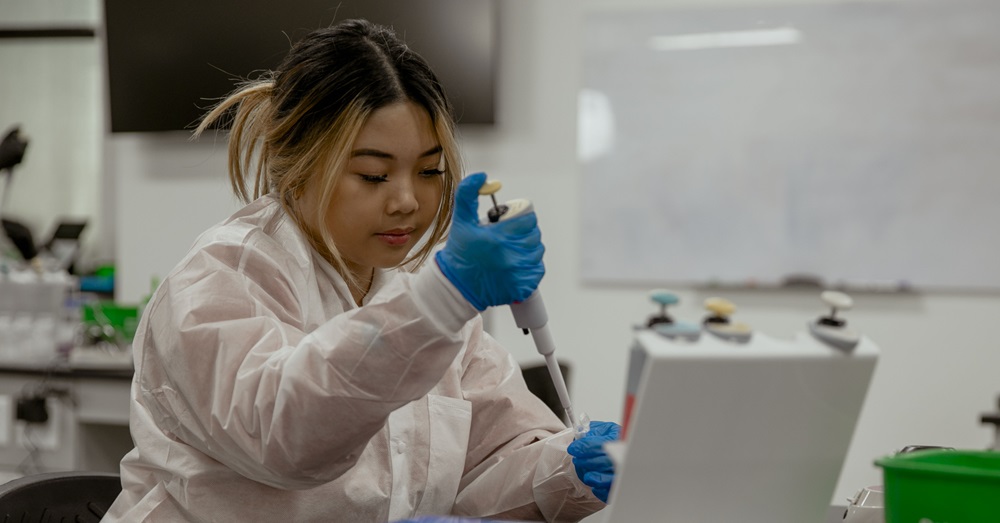Is it COVID, Flu, or RSV? Find Out With Just One Swab

Whether you’re fighting COVID, flu, or RSV, one molecular test can tell you in just fifteen minutes. Celesta Gibbs, Assistant Professor in Molecular Pathology for the Department of Laboratory Sciences and Primary Care, tells us all about this cutting-edge technology, how she’s teaching her students to utilize it, and how it can benefit patients and the future of health care.
What is it?

Celesta Gibbs
The BioFire Spotfire Respiratory Panel Mini is a PCR test made by a company called BioFire Diagnostics, known for making syndromic panels that test for infectious disease targets.
It's a test that uses a nasal swab covering five different targets, and it takes approximately 15 minutes to get the result.
According to Gibbs, the test is quite reliable, with a published positive and negative accuracy of 98% - very high.
What does it test for?
According to BioFire, the Spotfire Respiratory Panel Mini tests for:
- Coronavirus SARS-CoV-2
- Human rhinovirus
- Influenza A virus
- Influenza B virus
- Respiratory syncytial virus
What are the benefits of a test like this?
Gibbs explains that many molecular tests are usually a moderate or high complexity test that requires a skilled technician to perform them, but this respiratory panel mini test is waived, which means it is basically impossible to perform the test incorrectly. But according to Gibbs, the biggest benefit of a test like this is efficiency.
“Having early detection is so important because most treatments require administration of a drug within the first 24 hours of infection,” Gibbs explains. “The impact that this test can make for many patients is getting rid of the guessing game and providing ease of mind, letting people know what the problem is, all while being tested for multiple things at once.”
How can it impact the future of health care?
Gibbs and other TTUHSC MP professors have already introduced this technology into their curriculum, ensuring that the students are up to date on the latest technology, but also influencing the next generation of health care workers.
“In the Molecular Pathology program, we teach our students to design and validate tests so they could do something like this,” Gibbs says. “This technology inspires our students to think outside the box and have aspirations to create new things.”
Related Stories
TTUHSC Receives $1 Million Gift from Amarillo National Bank to Expand and Enhance Pediatric Care in the Panhandle
TTUHSC School of Medicine leaders accepted a $1 million philanthropic gift from Amarillo National Bank on Tuesday (Feb. 10), marking a transformational investment in pediatric care for the Texas Panhandle.
Texas Tech University Health Sciences Center Permian Basin Announces Pediatric Residency Program Gift
TTUHSC Permian Basin, along with the Permian Strategic Partnership and the Scharbauer Foundation, Feb. 5 announced a gift that will fund a new pediatric residency.
The Ph.D. Programs that Shape Health Care
The Graduate School of Biomedical Sciences Ph.D. programs at TTUHSC provide the foundation, mentorship and research opportunities you need to pursue groundbreaking work.
Recent Stories
The John Wayne Cancer Foundation Surgical Oncology Fellowship Program at Texas Tech University Health Sciences Center Announced
TTUHSC is collaborating with the John Wayne Cancer Foundation and has established the Big Cure Endowment, which supports the university’s efforts to reduce cancer incidence and increase survivability of people in rural and underserved areas.
TTUHSC Receives $1 Million Gift from Amarillo National Bank to Expand and Enhance Pediatric Care in the Panhandle
TTUHSC School of Medicine leaders accepted a $1 million philanthropic gift from Amarillo National Bank on Tuesday (Feb. 10), marking a transformational investment in pediatric care for the Texas Panhandle.
Texas Tech University Health Sciences Center Permian Basin Announces Pediatric Residency Program Gift
TTUHSC Permian Basin, along with the Permian Strategic Partnership and the Scharbauer Foundation, Feb. 5 announced a gift that will fund a new pediatric residency.
